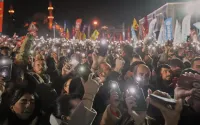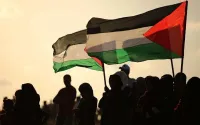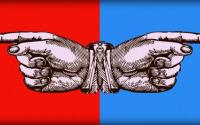Phil Reeves: Are we seeing the first cracks in Israeli support of Ariel Sharon?
19 February 2002
Something new and important is stirring on Israel's political landscape. It is still in its infancy. But there is no doubt that the ground beneath the boots of ex-general Ariel Sharon is beginning to shift.A year ago, he won a landslide election by promising to deliver peace and security to Israel in the face of the Palestinian intifada, then five months old. Since then, Israeli forces have maintained a rigid military blockade against the occupied territories. They have turned the use of F-16 bombing raids into a routine event, bulldozed hundreds of homes, repeatedly raided Palestinian-run areas and assassinated scores of suspects.
Yet Palestinian armed groups have increased attacks; suicide bombers – including five suspected attempts this weekend alone – continue to set off on missions to maim and kill Jews. As the violence worsens, frustrated Israelis across the political spectrum are concluding that Mr Sharon's attempts to seek a military solution to the conflict are misguided. And they are beginning to say so publicly in growing numbers.
The last week – which included the loss of seven Israeli lives in 72 hours, even before yesterday's killings – has been particularly significant. Israel has been through bloodier episodes during the conflict, such as the 12-hour nightmare in December when three Hamas suicide bombers massacred 26 Israelis. But this time, the circumstances were particularly troubling.
Palestinian guerrillas managed for the first time to destroy a Merkava-3, Israel's main battle tank and pride of its armoured corps, with a home-made mine buried by a road in the Gaza Strip. The attack, which killed three young Israeli crewmen, came after Israel's biggest batch of raids into Palestinian-run parts of the Gaza Strip, operations that were meant as a deterrent.
To this humiliation was added the loss of a senior commander from one of the highly-trained undercover squads routinely used for assassination missions, reportedly when a wall fell on him during a raid in a West Bank village. A soldier was also shot dead at a checkpoint. And two Israeli teenagers were murdered by a suicide bomber who blew himself up in a pizza joint in a fenced-in settlement.
As one blunder followed another, and tragedy followed tragedy, critical voices in Israel rose. "After 17 months of intifada, we must admit that the Palestinians have not been broken," wrote Nahum Barnea, a leading commentator in Israel's mass-circulation Yedioth Ahronoth newspaper, "Despair has only steeled them. Economic and human distress has only pushed them to acts of madness."
Such was the overall change in mood that the Jerusalem Post, Israel's hard-right English-language newspaper, declared angrily yesterday that Israel's "resolve" was cracking and a "chorus of defeatism can be heard in the land".
It is not, in fact, a chorus. The voices raised against Ariel Sharon and his coalition government – with its awkward marriage of the right-wing Likud and the centrist Labour – do not sing in unison. Nor have they yet had much impact on his approval ratings which hover impressively at around 60 per cent, although – with escalating violence and an ailing economy – these may well change.
The voices come from the left and the far right. And now, significantly, they have now also been joined by elements from the centre – the natural habitat of the majority of Israeli voters in less violent times.
The latter emerged yesterday in the form of an organisation called the Council for Peace and Security, a group of 1,000 reserve generals and other senior officers and ex-officials from Israel's Mossad and Shin Bet security services. It has declared that it is mounting a public campaign calling on Israel unilaterally to withdraw from all of Gaza and part of the West Bank, which would including evacuating about 50 of the Jewish settlements built in the occupied territories. Their plan is unpalatable even to Palestinian moderates – it falls far short of an agreement based on the borders of 4 June 1967, their primary requirement – and is firmly centrist in Israeli political terms.
But it's significant because it amounts to an attack by a distinguished and senior group of Israelis security and military officials on Mr Sharon – an ex-colleague whose entire philosophy is embedded in military doctrine. "The clock has begun ticking for Ariel Sharon," wrote one council member, David Kimche, in an article yesterday, "Our prime minister is still immensely popular, he still commands majority approval in the polls, yet with every passing day more and more people realise that the government has no answer for the dire straits in which we are foundering."
The council – though very different – is following the Israeli left, which swung into action recently after more than a year of hibernation. For the last two weekends, thousands of Israelis have taken part in anti-war demonstrations in Tel Aviv demanding that Israel withdraw from the occupied territories. Although numbers have been relatively low by the standards of Israel, with no more than 10,000 at each event, they seem likely to grow as a national debate about Israel's handling of the conflict gathers volume.
A major part in their comeback, and also in the general change in the political climate, is being played by a group of Israeli army reservists, including many officers from combat units, who last month published a petition stating that they would refuse to serve in the West Bank or Gaza Strip, as the occupation is "corrupting" Israel. Their personal stories have begun to appear on Israeli television, including alarming accounts of being given orders to shoot Palestinians for stone-throwing.
When the refuseniks first made their protest public, they comprised around 50 people. Since then, their ranks have more than quadrupled. Angered and alarmed, the government and the military leadership has dithered over how to handle them, knowing that harsh measures may play into the reservists' hands. This weekend, their dilemma deepened with the decision by Michael Ben-Yair, Israel's attorney-general during the government of the late Yitzhak Rabin, to support them.
The key issue now is whether Mr Sharon will pay any heed to the rumbling beneath his feet. At his back stands the far right, some of whom are calling on him to take truly draconian measures, such as expelling all Arabs from the West Bank. So far there is no sign that, at 73, he is inclined to change his view – that military force succeeds in the end.






